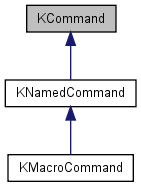kdeui
KCommand Class Reference
The abstract base class for all Commands. More...
#include <kcommand.h>

Public Member Functions | |
| virtual void | execute ()=0 |
| virtual QString | name () const =0 |
| virtual void | unexecute ()=0 |
| virtual | ~KCommand () |
Protected Member Functions | |
| KCommand () | |
| virtual void | virtual_hook (int id, void *data) |
Detailed Description
The abstract base class for all Commands.Commands are used to store information needed for Undo/Redo functionality...
Definition at line 37 of file kcommand.h.
Constructor & Destructor Documentation
| KCommand::KCommand | ( | ) | [inline, protected] |
| KCommand::~KCommand | ( | ) | [virtual] |
Definition at line 29 of file kcommand.cpp.
Member Function Documentation
| virtual void KCommand::execute | ( | ) | [pure virtual] |
The main method: executes this command.
Implement here what this command is about, and remember to record any information that will be helpful for unexecute.
Implemented in KMacroCommand.
| virtual QString KCommand::name | ( | ) | const [pure virtual] |
- Returns:
- the name of this command, translated, since it will appear in the menus.
Implemented in KNamedCommand.
| virtual void KCommand::unexecute | ( | ) | [pure virtual] |
Unexecutes (undo) this command.
Implement here the steps to take for undoing the command. If your application uses actions for everything (it should), and if you implement unexecute correctly, the application is in the same state after unexecute as it was before execute. This means, the next call to execute will do the same thing as it did the first time.
Implemented in KMacroCommand.
| void KCommand::virtual_hook | ( | int | id, | |
| void * | data | |||
| ) | [protected, virtual] |
The documentation for this class was generated from the following files:
 KDE 3.5 API Reference
KDE 3.5 API Reference